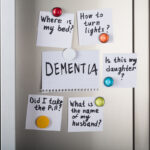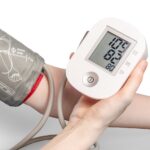Introduction
Dementia is a syndrome resulting from brain disease, characterised by a global cognitive decline, which may include disturbances of thinking, memory, comprehension and orientation.
Symptoms can vary, depending on the cause, but memory difficulties are often the first problem to be noticed. There is sometimes a change in personality with alterations in behaviour, termed ‘BPSD’ (behavioural and psychological symptoms of dementia).
There are several types of dementia. We could talk about each in much greater detail, but in summary the most prevalent types are:
- Alzheimer’s disease (most common form of dementia)
- Lewy body dementia
- Vascular dementia
- Frontotemporal dementia
- Rarer causes e.g. HIV, vitamin B12 deficiency, etc
What we already know
Screening and diagnosis of dementia has much improved over the last few years, with many areas of the country having a specific ‘memory clinic’ service, although controversy remains about which instrument to use to diagnose dementia.
The management of dementia includes both pharmacological treatment and non-pharmacological considerations (e.g. ensuring the environment is appropriate, providing activity and stimulation and addressing communication needs).
The use of acetylcholinesterase inhibitors has become much more widespread over recent years and, although it is no wonder drug or cure, for some people with Alzheimer’s, it can slow the progression of the disease. NICE guidelines recommend the use of Donepezil, Galantamine or Rivastigmine for mild-moderate Alzheimer’s disease. Mematine is recommended as an option for those with moderate Alzheimer’s disease who cannot tolerate acetylcholinesterase inhibitors, or for those with severe Alzheimer’s disease.
Areas of uncertainty
What actually causes dementia? We know lots of factors and even some genetic changes that are associated with dementia but we know little about the actual direct causes of dementia.
There is also uncertainty about the reason that some people progress from Mild Cognitive Impairment (memory impairment that does not meet diagnostic threshold of dementia) to dementia and how to predict who this will happen to.
What’s in the pipeline
Media reports often hint at a progression towards finding a cure for dementia. In practice we may not be that close, but there are several areas that researchers are working on:
- Gene therapy
- A vaccine for dementia
- The use of stem cells to develop replacement cells lost in dementia
References
Giebel, C. M., Sutcliffe, C., Stolt, M., Karlsson, S., Renom-Guiteras, A., Soto, M., … Challis, D. (2014). Deterioration of basic activities of daily living and their impact on quality of life across different cognitive stages of dementia: a European study. International Psychogeriatrics / IPA, 26(8), 1283–93. doi:10.1017/S1041610214000775 [Abstract]
NICE guidelines CG42 (2015) “Dementia: Supporting people with dementia and their carers in health and social care” [PDF]
Semple, D. and Smyth, R. (eds.) (2013) Oxford Handbook of Psychiatry. 3rd ed. Oxford: Oxford University Press. [Publisher]
Acknowledgement
Written by: Josephine Neale
Reviewed by:
Last updated: Sep 2015
Review due: Sep 2016











